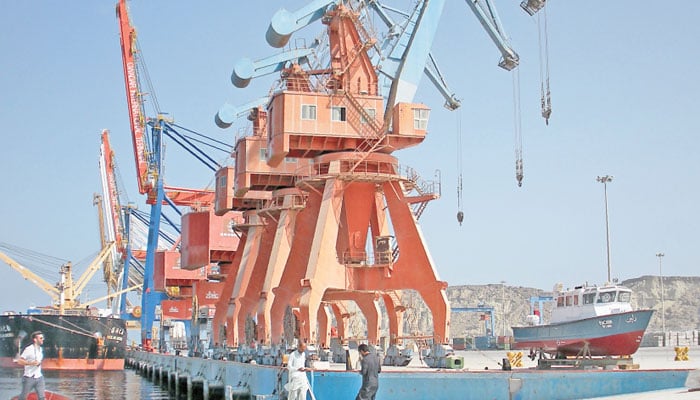Amid much higher expectations, Pakistan and China are all set to hold 7th Joint Cooperation Committee (JCC) meeting this week in Islamabad under the umbrella of the ambitious China-Pakistan Economic Corridor (CPEC).
Insight


Amid much higher expectations, Pakistan and China are all set to hold 7th Joint Cooperation Committee (JCC) meeting this week in Islamabad under the umbrella of the ambitious China-Pakistan Economic Corridor (CPEC). During this JCC meeting, Islamabad will be focusing upon materialising industrial cooperation to turn the dream of being part of the biggest global supply chain into a reality.
However, at the moment it is just a dream, because China has placed different kinds of tariff and non-tariff barriers in a deliberate effort to curb supply of goods in shape of exports from the Pakistani side.
Under these circumstances, the question arises what does the CPEC mean? Is it only the construction of roads, railway lines, and development of the half cooked Gwadar port, where scarcity of water is still posing the biggest challenge for human lives?
It is time to remind the Chinese leadership visiting Islamabad this week that only the sharing of benefits emanating from the CPEC could guarantee its long lasting success, and favouring anyone would not go forever on a sustained basis.
Many of those, who are affiliated with the corridor projects are making all out efforts to convince that the coming year, ie 2018, will be a milestone in the success of the CPEC. Many are apprehensive that CPEC also poses serious economic challenges for the country in the wake of the rapidly evaporating hard-earned macroeconomic gains. Only time can time where the tide will take the country as far as the economy is concerned.
Although Pakistan and China have been long-lasting and time-tested friends over decades, there is still need to convert the strategic ties into economically dependent ones between both countries.
For achieving this objective, China will have to play its role in a more effective manner. Recent examples in the case of Sri Lanka, Central Asia and Africa do not seem to be very positive as far as receiving increased Chinese involvement in economic and financial affairs is concerned. Colombo had to go back to the International Monetary Fund (IMF) programme after getting Chinese investment into different projects.
There is need to reverse this apprehension and it can only be done if Beijing provides incentives to Pakistan to establish joint ventures in industrial cooperation and help Islamabad for boosting its dwindling exports.
First of all, Pakistan and China must move forward for resolving the lingering stalled progress on signing the Free Trade Agreement (FTA) in favour of Pakistan, because Islamabad cannot afford the rising trade deficit with China coupled with increasing over-invoicing. The over-invoicing between the two sides stands at around $4 to $6 billion on annual basis and it can be resolved through exchange of data with customs authorities on real time basis. Both the countries will have to devise a mechanism to ensure Exchange Data Information (EDI) of all exportable and importable goods in order to avoid mis-declaration at massive levels.
However, Planning Commission’s deputy project director for CPEC Hasan Daud, while reacting to the CPEC progress excitedly said, both the countries were in the process of finalising the Long Term Plan (2014-2030) to resolve all arising issues in an amicable manner. “We are already discussing these issues and after removing bottlenecks of energy and infrastructure, will shift the focus towards measures for boosting industrial relations to incentivise our exports in the months and years to come,” he added.
Hasan Daud said the coming year 2018 would be quite important for deliverables related to the corridor, so things would start moving towards the desired objectives.
The government had convened pre-JCC meeting last week to hold consultations with all federal ministries, four chief ministers, and chief ministers of Azad Jammu and Kashmir (AJK), Gilgit-Baltistan (GB), as well as Federally Administered Tribal Areas (FATA) for devising a joint strategy for the upcoming JCC meeting scheduled to be held in Islamabad on November 21 and 22, 2017.
Three important projects related to Gwadar include the international airport, Eastbay Expressway and 300 megawatt power plant, which will be entering into the construction phase. The groundbreaking of Eastbay Expressway for linking the port with the coastal area will be done this week.
The designing of Gwadar International Airport and mode of financing have been finalised and its construction phase will be kick-started soon.
Four feasibility studies for establishing Special Economic Zones (SEZs) have already been submitted. Under the proposed SEZs, Chinese are interested to relocate their industries here in Pakistan, paving the way for exploring options to give boost to our dwindling exports in years to come.
The provinces are in the process for completing feasibility studies for establishing nine Special Economic Zones under the China-Pakistan corridor.
Total nine SEZs will be established including each one in all four provinces, one each in GB, AJK, FATA and two in the federal capital. The Mainline (ML-1) of Pakistan Railways from Peshawar to Karachi will be part of the upcoming JCC agenda, said an official, and added that the estimated cost of this project stood at Rs8,130 billion. With financing of over $8 billion, the rail line will be upgraded.
China would finance the over $8 billion project in order to overhaul the rail network which would be completed in a four-year period. The Karachi Circular Railway (KCR) with estimated cost of $2.07 billion would be part of the agenda, however, Sindh had raised objection that the federal government was creating stumbling blocks in the way of this project.
The long term plan (LTP-2014-2030) is expected to be signed between the two countries despite the fact that the Chinese had raised certain objections related to the Federal Board of Revenue (FBR) and the State Bank of Pakistan. It is not yet known whether both sides would succeed in breaking this impasse or it would take more time for further deliberations.
Pakistan is at crossroads in the aftermath of the corridor, but its success now depends upon two factors. One is that China will have to show generosity for creating a win-win situation, while the second is that Islamabad’s policy makers will have to negotiate really hard and implementers have to deliver.
The writer is a staff member